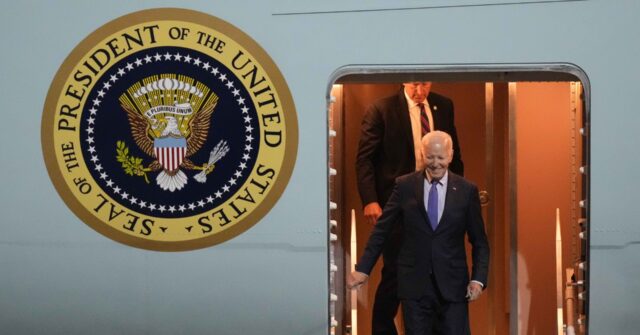President Joe Biden recently visited Germany, where upon arrival, he addressed reporters regarding his conversation with Israeli Prime Minister Benjamin Netanyahu. During this dialogue, Biden expressed his congratulations to Netanyahu on the successful targeting and killing of Hamas leader Yayha Sinwar. He mentioned that it was an opportune moment to push for an end to the ongoing conflict in Gaza and emphasized the need for a ceasefire as well as the release of hostages. The president’s comments highlighted a broader desire for a resolution that could pave the way for improved conditions in the region and beyond.
In his statement, Biden characterized Sinwar as a figure with considerable blood on his hands, indicating the extent of violence attributed to the Hamas leader, which has caused suffering among various populations, including Americans and Israelis. Biden’s remarks underscored not only his administration’s support for Israel in targeting Hamas but also a shifting perspective towards a more conciliatory approach in the quest for peace. He called for a transition from ongoing military operations to diplomatic efforts aimed at establishing stability and securing the safe return of hostages, showcasing a delicate balance in U.S. foreign policy.
Despite his supportive remarks, it was evident that the Biden administration’s influence in the situation was limited. The United States administration’s previous attempts to guide Israel’s military strategy in Gaza were largely disregarded by Netanyahu, with Biden admitting that the Israeli Prime Minister had not adhered to the American demands for restraint in their military operations. This situation reflects a complex relationship between the two leaders and highlights the challenge of balancing U.S. diplomatic interests with Israel’s military objectives in the region.
Looking forward, Biden mentioned the upcoming visit of Secretary of State Antony Blinken to Israel, which is aimed at furthering discussions related to the ongoing conflict, ceasefire negotiations, and the humanitarian situation on the ground. This visit signifies the administration’s commitment to engaging with Israeli officials to foster dialogue and explore potential pathways towards a peaceful resolution. The outcome of such engagements will be crucial in assessing the effectiveness of U.S. diplomacy in the context of escalating tensions and violence in Gaza.
Biden’s statement, while expressing satisfaction with Israel’s military achievements against Hamas, also reflects broader concerns about the humanitarian consequences of prolonged warfare. The push for a ceasefire indicates an awareness that continued hostilities not only threaten regional stability but also pose significant risks to innocent lives. The president’s advocacy for a peaceful resolution seeks to address both security concerns for Israel and the urgent need for humanitarian assistance for the affected Palestinians in Gaza.
In conclusion, Biden’s remarks during his visit to Germany encapsulate a pivotal moment in U.S.-Israel relations, characterized by a mix of approval for military actions while advocating for a swift end to the conflict. The complexities of these dynamics underscore the delicate nature of international diplomacy in a region marked by deep-seated tensions and ongoing cycles of violence. The upcoming diplomatic efforts led by Secretary Blinken will be vital in determining the trajectory of U.S. involvement and prospects for peace in the Middle East.

